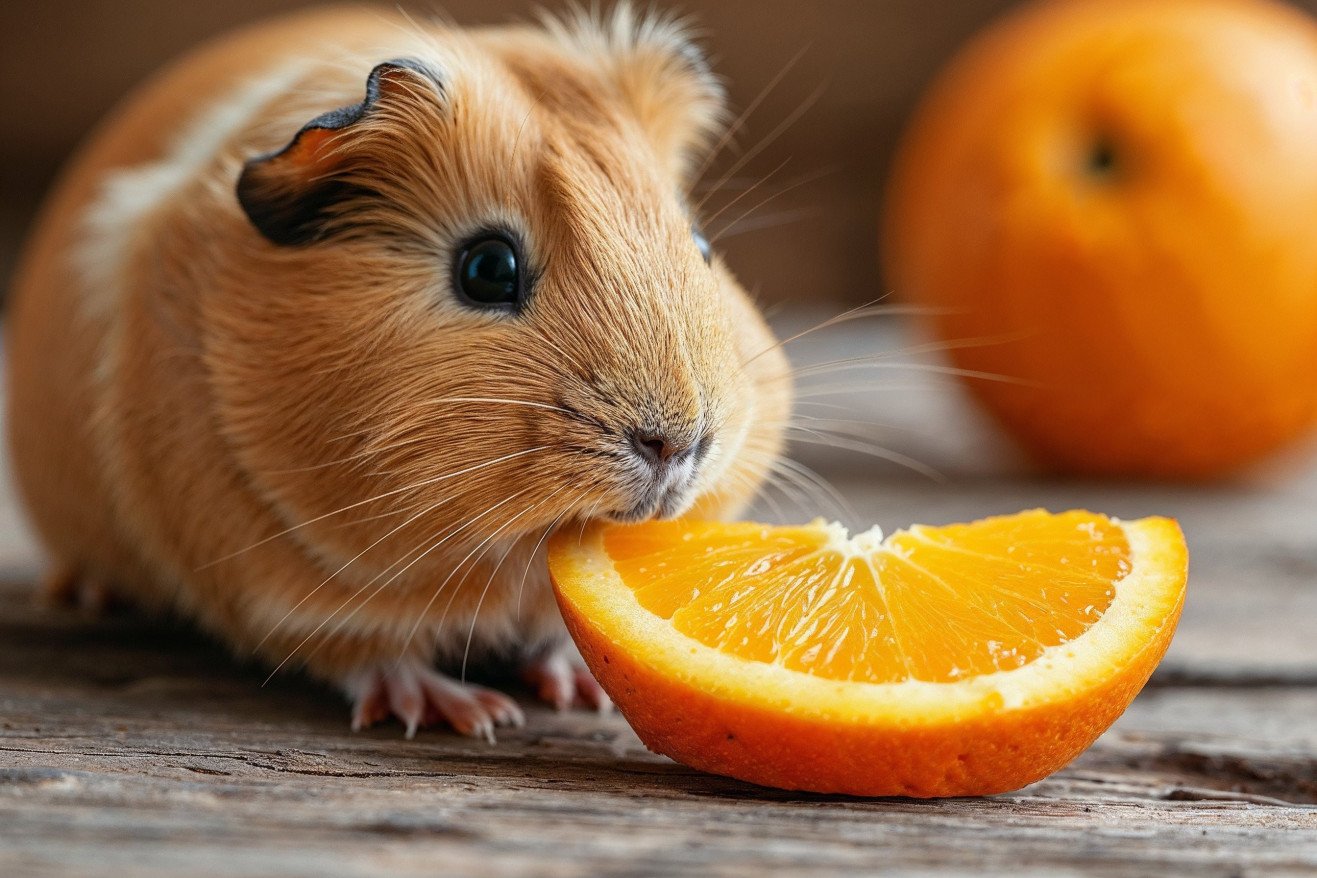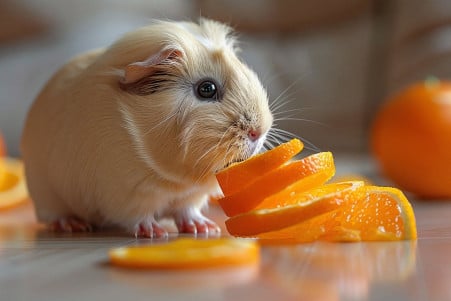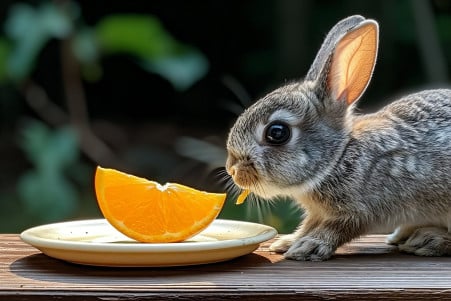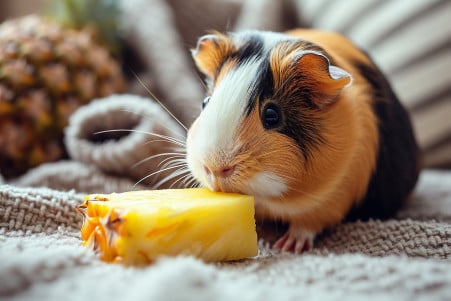Can Guinea Pigs Eat Oranges? Safe Citrus Feeding Tips
23 January 2024 • Updated 28 January 2024

Oranges are a delicious snack, but can guinea pigs have oranges? Yes, guinea pigs can eat oranges in moderation. Oranges provide guinea pigs with the Vitamin C they need, but they also have a high sugar content. To avoid tummy troubles, only give your guinea pig a small amount of orange once or twice a week, and make sure to wash the skin thoroughly before you give it to them.
This investigation will take a deep dive into veterinary science and nutritional research to assess the dietary requirements of guinea pigs. We will look at the pros and cons of feeding guinea pigs fruit like oranges, including their special need for Vitamin C and the effects of sugar on their health.
By the end of this piece, you will have a comprehensive understanding that will help you make the best dietary decisions for your pet.
Can guinea pigs eat oranges?
Nutritional Value of Oranges for Guinea Pigs
Oranges are rich in ascorbic acid, or Vitamin C, which is a vital nutrient for guinea pigs. Because guinea pigs can’t produce their own Vitamin C, it’s important for pet parents to make sure their guinea pigs get enough of this nutrient from fruits like oranges to avoid deficiencies and conditions like scurvy.
According to Pet Keen, oranges contain a whopping 1 milligram of Vitamin C per gram, as well as other nutrients like dietary fiber and calcium, although these are present in smaller amounts.
In addition to preventing scurvy, Vitamin C is important for the formation and maintenance of skin, joints, and mucosal surfaces, says VCA Animal Hospitals. It also helps with wound healing and other bodily functions. Meanwhile, the antioxidants in oranges can help support guinea pigs’ immune systems, which can help them stay healthy.
To make sure that guinea pigs get the benefits of oranges without any potential downsides, experts recommend feeding them oranges in moderation. A piece the size of your thumb or a few small pieces once or twice a week is plenty. This amount ensures that guinea pigs get the nutrients they need without overdoing it, which will help keep them healthy.
How to Create a Healthy Diet for Your Guinea Pig
The most important part of a guinea pig’s diet is high-quality hay, which meets their need for constant grazing and helps keep their teeth and digestive system healthy, according to the RSPCA.
Fresh, grass-based pellets are also important because they provide a source of concentrated nutrition, including Vitamin C, which guinea pigs can’t produce on their own. The UK Pet Food recommends adjusting the amount of pellets you feed your guinea pig based on their life stage and health.
A healthy guinea pig diet also includes a variety of fresh vegetables, especially leafy greens like kale and broccoli, which are known for their high Vitamin C content. While fruits should not be a regular part of a guinea pig’s diet because of their high sugar content, they can be used as occasional treats to help provide additional nutrients and keep the diet interesting. However, some fruits, like citrus, should be fed in moderation.
To make sure your guinea pig gets enough Vitamin C, The Spruce Pets suggests that caregivers not rely on pellets alone because the vitamin may lose its potency over time. Instead, they recommend supplementing pellets with other foods that are high in Vitamin C, like bell peppers or strawberries, in moderation.
A well-rounded diet will help prevent nutritional deficiencies and keep your guinea pig interested in their food, leading to a healthier life with fewer sugar-related health issues.
Sugar Content and Health Risks
Oranges are a healthy fruit, but they are also a high-sugar fruit. According to MyFoodData, a large orange has 17.2 grams of sugar. While this is healthy for humans, it can be dangerous for guinea pigs.
This is because guinea pigs are unable to process sugar well, according to a study on diet-induced metabolic disorders in guinea pigs, which was published in PMC. This inability to process sugar can lead to health problems like obesity and diabetes.
If a guinea pig is experiencing health problems due to sugar intake, symptoms can include weight gain, lethargy, and changes in eating habits or stool.
To avoid these problems, guinea pig owners need to be careful about how much sugar they give their pets. This means that when they first give their guinea pigs oranges, they should give them a small piece and watch for any negative reactions.
They should also continue to monitor their guinea pigs’ weight and behavior and adjust their diets as necessary to ensure they stay healthy while still enjoying the occasional orange. This can also be done by balancing high-sugar fruits with low-sugar fruits to avoid the negative effects of high sugar intake while still reaping the benefits of the vitamins and minerals in oranges.
How Oranges’ Acidity Affects Guinea Pig Digestion
While guinea pigs are well-equipped to digest fibrous plant materials, their ability to digest the acidity of oranges is less certain. A review in PMC mentioned that guinea pigs are susceptible to gastrointestinal diseases, but it didn’t specifically call out citrus fruits.
That said, their digestive systems are highly dependent on the right balance of their natural high-fiber diet. Supreme Petfoods also pointed out that the guinea pig’s large caecum, which houses the bacteria that help ferment and break down fibrous materials, may not be as efficient at dealing with acidic materials.
When it comes to feeding guinea pigs oranges, the potential for digestive upset due to the acidity of the fruit is a major concern. The Guinea Pig Vet explained that, unlike rabbits, guinea pigs don’t have a way to separate and reprocess fibrous and non-fibrous materials efficiently.
This means that they have a limited ability to neutralize the acidity of fruits like oranges. To make sure that your guinea pig doesn’t experience digestive upset, it’s important to introduce oranges slowly and in small amounts and watch for any signs of digestive distress.
By feeding oranges in moderation and making sure that the rest of your guinea pig’s diet is made up of hay, vegetables, and specially formulated pellets, you can make sure that your guinea pig’s digestive system stays in balance. This will allow them to enjoy oranges as an occasional treat without any negative effects on their health.
Allergies in Guinea Pigs: Can They Be Allergic to Oranges?
There are many things that guinea pigs can be allergic to. According to PetHelpful, some common allergens include bedding like cedar and pine shavings, certain foods like chocolate, and even some natural remedies like aloe vera. While the article doesn’t list oranges as an allergen, it’s important to remember that any new food can potentially cause an allergic reaction in guinea pigs.
Cases listed on PMC have shown that people have had severe allergic reactions to guinea pigs, which can present in a number of ways, including skin and respiratory issues. In guinea pigs, allergic reactions can present as itching, skin issues, or trouble breathing. If your guinea pig shows any of these signs after eating oranges, it’s important to remove oranges from their diet and consult a vet.
To avoid allergies, make sure to introduce new foods like oranges in very small amounts and watch your guinea pig for any signs of an allergic reaction. This will help ensure that any dietary changes are safe and healthy for your pet, helping to support their health as you learn more about the best ways to care for them.
Conclusion: Can Guinea Pigs Eat Oranges?
In conclusion, when it comes to the health of your guinea pig, oranges are a great way to add some zest to their diet. They are a tangy source of Vitamin C, which is an essential nutrient for guinea pigs since they can’t produce it on their own.
This makes them a fun way to help prevent deficiencies like scurvy and can even help with their overall health due to their antioxidant properties. That said, it’s important to remember that oranges should be fed in moderation.
While the sugar in oranges is natural, it can still lead to obesity and diabetes, which guinea pigs are already prone to, if they eat too much.
It’s also important to remember that while oranges can be a fun treat, they should only be a small part of your guinea pig’s diet. You should always make sure that the majority of their diet is made up of hay, vegetables, and fortified pellets, with oranges and other fruits being a fun, occasional treat.
You should also make sure to watch your guinea pig’s reaction to oranges, as their acidity can lead to digestive issues.
If you do decide to feed your guinea pig oranges, make sure to do so in small amounts and introduce them slowly. You should also make sure to mix them in with other Vitamin C–rich foods to make sure that they are getting a well-rounded diet.
This will help you make sure that your guinea pig is getting all of the benefits of oranges without any of the risks, and will help you make sure that your guinea pig is as happy and healthy as possible.


